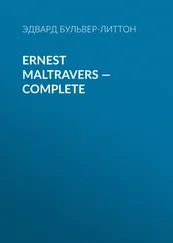Эдвард Бульвер-Литтон - Ernest Maltravers — Volume 09
Здесь есть возможность читать онлайн «Эдвард Бульвер-Литтон - Ernest Maltravers — Volume 09» — ознакомительный отрывок электронной книги совершенно бесплатно, а после прочтения отрывка купить полную версию. В некоторых случаях можно слушать аудио, скачать через торрент в формате fb2 и присутствует краткое содержание. Жанр: foreign_prose, literature_19, Европейская старинная литература, foreign_antique, на английском языке. Описание произведения, (предисловие) а так же отзывы посетителей доступны на портале библиотеки ЛибКат.
- Название:Ernest Maltravers — Volume 09
- Автор:
- Жанр:
- Год:неизвестен
- ISBN:нет данных
- Рейтинг книги:3 / 5. Голосов: 1
-
Избранное:Добавить в избранное
- Отзывы:
-
Ваша оценка:
- 60
- 1
- 2
- 3
- 4
- 5
Ernest Maltravers — Volume 09: краткое содержание, описание и аннотация
Предлагаем к чтению аннотацию, описание, краткое содержание или предисловие (зависит от того, что написал сам автор книги «Ernest Maltravers — Volume 09»). Если вы не нашли необходимую информацию о книге — напишите в комментариях, мы постараемся отыскать её.
Ernest Maltravers — Volume 09 — читать онлайн ознакомительный отрывок
Ниже представлен текст книги, разбитый по страницам. Система сохранения места последней прочитанной страницы, позволяет с удобством читать онлайн бесплатно книгу «Ernest Maltravers — Volume 09», без необходимости каждый раз заново искать на чём Вы остановились. Поставьте закладку, и сможете в любой момент перейти на страницу, на которой закончили чтение.
Интервал:
Закладка:
Lady Vargrave was kneeling on the other side of the bed, one hand clasped in her husband's, the other bathing his temples, and her tears falling, without sob or sound, fast and copiously down her pale fair cheeks.
Two doctors were conferring in the recess of the window; an apothecary was mixing drugs at a table; and two of the oldest female servants of the house were standing near the physicians, trying to overhear what was said.
"My dear, dear uncle, how are you?" asked Lumley.
"Ah, you are come, then," said the dying man, in a feeble yet distinct voice; "that is well—I have much to say to you."
"But not now—not now—you are not strong enough," said the wife, imploringly.
The doctors moved to the bedside. Lord Vargrave waved his hand, and raised his head.
"Gentlemen," said he, "I feel as if death were hastening upon me; I have much need, while my senses remain, to confer with my nephew. Is the present a fitting time?—if I delay, are you sure that I shall have another?"
The doctors looked at each other.
"My lord," said one, "it may perhaps settle and relieve your mind to converse with your nephew; afterwards you may more easily compose yourself to sleep."
"Take this cordial, then," said the other doctor.
The sick man obeyed. One of the physicians approached Lumley, and beckoned him aside.
"Shall we send for his lordship's lawyer?" whispered the leech.
"I am his heir-at-law," thought Lumley. "Why, /no/, my dear sir—no, I think not, unless he expresses a desire to see him; doubtless my poor uncle has already settled his worldly affairs. What is his state?"
The doctor shook his head. "I will speak to you, sir, after you have left his lordship."
"What is the matter there?" cried the patient, sharply and querulously.
"Clear the room—I would be alone with my nephew."
The doctors disappeared; the old women reluctantly followed; when, suddenly, the little Evelyn sprang forward and threw herself on the breast of the dying man, sobbing as if her heart would break.
"My poor child!—my sweet child—my own, own darling!" gasped out Lord Vargrave, folding his weak arms round her; "bless you—bless you! and God will bless you. My wife," he added, with a voice far more tender than Lumley had ever before heard him address to Lady Vargrave, "if these be the last words I utter to you, let them express all the gratitude I feel for you, for duties never more piously discharged: you did not love me, it is true; and in health and pride that knowledge often made me unjust to you. I have been severe—you have had much to bear—forgive me."
"Oh! do not talk thus; you have been nobler, kinder than my deserts.
How much I owe you—how little I have done in return!"
"I cannot bear this; leave me, my dear, leave me. I may live yet—I hope I may—I do not want to die. The cup may pass from me. Go—go—and you, my child."
"Ah, let /me/ stay."
Lord Vargrave kissed the little creature, as she clung to his neck, with passionate affection, and then, placing her in her mother's arms, fell back exhausted on his pillow. Lumley, with handkerchief to his eyes, opened the door to Lady Vargrave, who sobbed bitterly, and carefully closing it, resumed his station by his uncle.
When Lumley Ferrers left the room, his countenance was gloomy and excited rather than sad. He hurried to the room which he usually occupied, and remained there for some hours while his uncle slept—a long and sound sleep. But the mother and the stepchild (now restored to the sick-room) did not desert their watch.
It wanted about an hour to midnight, when the senior physician sought the nephew.
"Your uncle asks for you, Mr. Ferrers; and I think it right to say that his last moments approach. We have done all that can be done."
"Is he fully aware of his danger?"
"He is; and has spent the last two hours in prayer—it is a Christian's death-bed, sir."
"Humph!" said Ferrers, as he followed the physician. The room was darkened—a single lamp, carefully shaded, burned on a table, on which lay the Book of Life in Death: and with awe and grief on their faces, the mother and the child were kneeling beside the bed.
"Come here, Lumley," faltered forth the fast-dying man.
"There are none here but you three—nearest and dearest to me?—That is well. Lumley, then, you know all—my wife, he knows all. My child, give your hand to your cousin—so you are now plighted. When you grow up, Evelyn, you will know that it is my last wish and prayer that you should be the wife of Lumley Ferrers. In giving you this angel, Lumley, I atone to you for all seeming injustice. And to you, my child, I secure the rank and honours to which I have painfully climbed, and which I am forbidden to enjoy. Be kind to her, Lumley—you have a good and frank heart—let it be her shelter—she has never known a harsh word. God bless you all, and God forgive me—pray for me. Lumley, to-morrow you will be Lord Vargrave, and by and by" (here a ghastly, but exultant smile flitted over the speaker's countenance), "you will be my Lady—Lady Vargrave. Lady—so—so—Lady Var—"
The words died on his trembling lips; he turned round, and, though he continued to breathe for more than an hour, Lord Vargrave never uttered another syllable.
CHAPTER III
"Hopes and fears
Start up alarmed, and o'er life's narrow verge
Look down—on what?—a fathomless abyss."
"Contempt, farewell, and maiden pride, adieu!"
THE wound which Maltravers had received was peculiarly severe and rankling. It is true that he had never been what is called violently in love with Florence Lascelles; but from the moment in which he had been charmed and surprised into the character of a declared suitor, it was consonant with his scrupulous and loyal nature to view only the bright side of Florence's gifts and qualities, and to seek to enamour his grateful fancy with her beauty, her genius, and her tenderness for himself. He had thus forced and formed his thoughts and hopes to centre all in one object; and Florence and the Future had grown words which conveyed the same meaning to his mind. Perhaps he felt more bitterly her sudden and stunning accusations, couched as they were in language so unqualified, because they fell upon his pride rather than his affection, and were not softened away by the thousand excuses and remembrances which a passionate love would have invented and recalled. It was a deep, concentrated sense of injury and insult, that hardened and soured his whole nature—wounded vanity, wounded pride, and wounded honour.
And the blow, too, came upon him at a time when he was most dissatisfied with all other prospects. He was disgusted with the littleness of the agents and springs of political life—he had formed a weary contempt for the barrenness of literary reputation. At thirty years of age he had necessarily outlived the sanguine elasticity of early youth, and he had already broken up many of those later toys in business and ambition which afford the rattle and the hobby-borse to our maturer manhood. Always asking for something too refined and too exalted for human life, every new proof of unworthiness in men and things saddened or revolted a mind still too fastidious for that quiet contentment with the world as it is, which we must all learn before we can make our philosophy practical and our genius as fertile of the harvest as it may be prodigal of the blossom. Haughty, solitary, and unsocial, the ordinary resources of mortified and disappointed men were not for Ernest Maltravers. Rigidly secluded in his country retirement, he consumed the days in moody wanderings; and in the evenings he turned to books with a spirit disdainful and fatigued. So much had he already learned, that books taught him little that he did not already know. And the biographies of authors, those ghost-like beings who seem to have had no life but in the shadow of their own haunting and imperishable thoughts, dimmed the inspiration he might have caught from their pages. Those slaves of the Lamp, those Silkworms of the Closet, how little had they enjoyed, how little had they lived! Condemned to a mysterious fate by the wholesale destinies of the world, they seemed born but to toil and to spin thoughts for the common crowd—and, their task performed in drudgery and in darkness, to die when no further service could be wrung from their exhaustion. Names had they been in life, and as names they lived for ever, in life as in death, airy and unsubstantial phantoms. It pleased Maltravers at this time to turn a curious eye towards the obscure and half-extinct philosophies of the ancient world. He compared the Stoics with the Epicureans—those Epicureans who had given their own version to the simple and abstemious utilitarianism of their master. He asked which was the wiser, to sharpen pain or to deaden pleasure—to bear all or to enjoy all; and, by a natural reaction which often happens to us in life, this man, hitherto so earnest, active-spirited, and resolved on great things, began to yearn for the drowsy pleasures of indolence. The garden grew more tempting than the porch. He seriously revolved the old alternative of the Grecian demi-god—might it not be wiser to abandon the grave pursuits to which he had been addicted, to dethrone the august but severe ideal in his heart, to cultivate the light loves and voluptuous trifles of the herd, and to plant the brief space of youth yet left to him with the myrtle and the rose? As water flows over water, so new schemes rolled upon new—sweeping away every momentary impression, and leaving the surface facile equally to receive and to forget. Such is the common state with men of imagination in those crises of life, when some great revolution of designs and hopes unsettles elements too susceptible of every changing wind. And thus the weak are destroyed, while the strong relapse, after terrible but unknown convulsions, into that solemn harmony and order from which destiny and God draw their uses to mankind.
Читать дальшеИнтервал:
Закладка:
Похожие книги на «Ernest Maltravers — Volume 09»
Представляем Вашему вниманию похожие книги на «Ernest Maltravers — Volume 09» списком для выбора. Мы отобрали схожую по названию и смыслу литературу в надежде предоставить читателям больше вариантов отыскать новые, интересные, ещё непрочитанные произведения.
Обсуждение, отзывы о книге «Ernest Maltravers — Volume 09» и просто собственные мнения читателей. Оставьте ваши комментарии, напишите, что Вы думаете о произведении, его смысле или главных героях. Укажите что конкретно понравилось, а что нет, и почему Вы так считаете.












